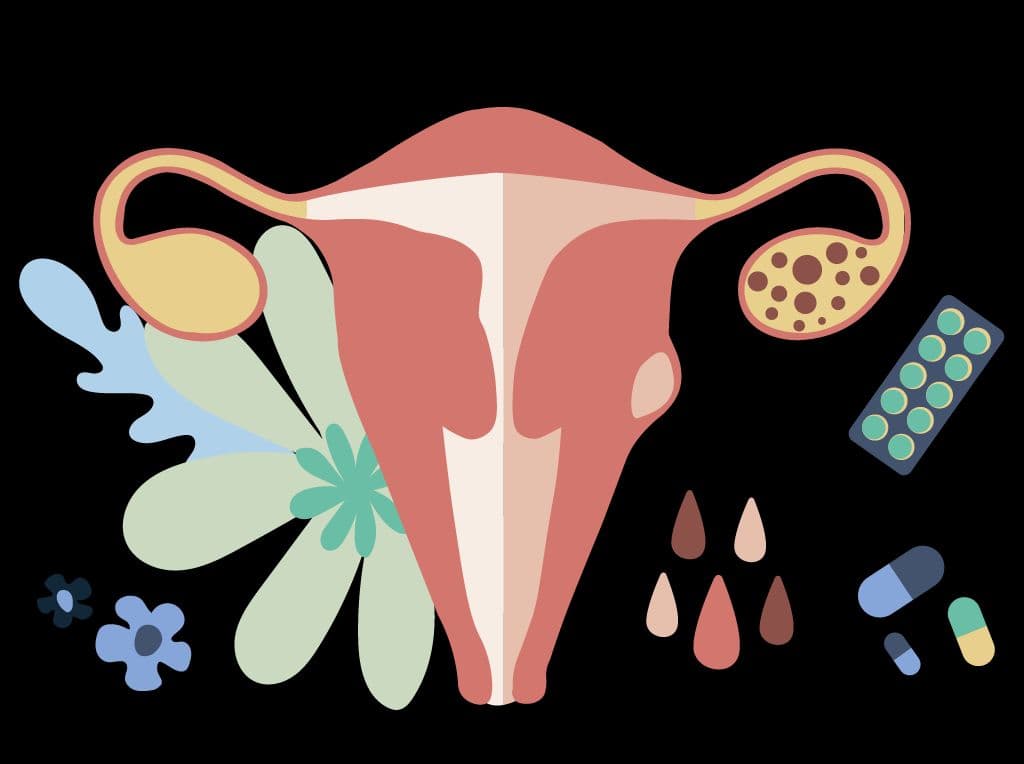This article is compiled by Sanjana Varma, a freelance writer at Proactive For Her.
How Is PCOS Diagnosed?
PCOS (Polycystic Ovary Syndrome) is a hormonal disorder that affects women of childbearing age. Menstruators with PCOS usually have at least two of the following three conditions:
- Irregular menstrual cycles
- ovaries (on ultrasound scan) show fluid-filled sacs or cysts
- Signs of excess androgens ( male hormones) on examination or blood test- acne, hair loss ( make pattern), hirsutism ( growth of extra unwanted hair) on the face, chin, and other parts of the body where women typically do not have hair.
Your physician will look for symptoms of this hormonal disorder based on which they may ask for tests to diagnose the condition accurately. It’s important to rule out underactive thyroid before making a diagnosis of PCOS, as symptoms often look similar.
What is the link between PCOS and Insulin resistance?
About 30% - 40% of women who have polycystic ovary syndrome (PCOS) also have insulin resistance. Insulin resistance is seen to be the root cause of PCOS as per some studies. In a normal person, insulin hormone is released in response to carbohydrate-rich meals. Insulin allows the body cells to take up glucose, which is later used for energy. When someone has insulin resistance, this process is affected, leading to high glucose levels in the blood. With time, larger and larger amounts of insulin are required before glucose is taken into the body tissues. Some experts believe that high insulin levels can cause androgen (male hormone) excess.
If you have insulin resistance or PCOS, you are also at risk of developing prediabetes, diabetes or even gestational diabetes (during pregnancy).
It’s very important to discuss this with your doctor and get yourself screened for insulin resistance with regular FBS (Fasting blood glucose), PLBS (post-lunch blood glucose) and HbA1C .

What’s the Treatment for PCOS?
Treatments can help you manage the symptoms of polycystic ovary syndrome (PCOS) and lower your odds for long-term health problems such as diabetes and heart disease. The treatment is based on the severity of the condition and the needs of the patient. For example, if you want to get pregnant and are having trouble, then your treatment would focus on helping you conceive. If you want to tame PCOS-related acne, your treatment would be geared toward skin problems.
Let’s take a look at the most common methods of treating PCOS.
Lifestyle Changes for PCOS
One of the best and easiest ways to deal with PCOS is to eat well and exercise regularly. The loss of 5% - 10% of extra body fat can help reduce insulin resistance and often reverse some of the PCOS symptoms. It can help with regularising your periods. It may also help manage problems with blood sugar levels and ovulation. Stick to your diet plans and find time to exercise daily, this method is proven to help with PCOS.
Birth control pills
Birth control pills are the most common PCOS treatment for women who don't want to get pregnant. These formulations contain a combination of both hormones estrogen and progesterone or one hormone alone. These birth control methods may also lower your chance of having endometrial cancer, in the inner lining of the uterus. Taking progestin hormone could help get your periods back on track. Some pills are skin friendly and can help reduce acne and hirsutism.
Insulin Sensitizers & Managing Weight Loss
For some people, a healthy diet or exercise alone may not help to curb their PCOS symptoms. In such cases, different pills called insulin sensitizers may be prescribed especially if there are prominent signs of insulin resistance or diabetes. Medications such as Metformin increase insulin sensitivity and help with maintaining (or losing) weight in some. If you’re severely obese and other methods haven’t helped you reach a healthy weight, your doctor may suggest weight-loss surgery. The change in your weight afterwards can regulate your menstrual cycle and hormones and reduce the risk of developing diabetes.
Managing hirsutism (Excessive hair growth)
One of the most visible symptoms of PCOS is hirsutism, or excessive hair growth on the face and the body. A couple of treatment techniques can address this problem like
- hair removal cream
- laser hair removal and electrolysis
- skin treatment to slow hair growth
- hormonal birth control pills
- Spironolactone ( blocks excess androgens)
Fertility problems
A lot of PCOS persons may have to deal with infertility. Many women do conceive spontaneously if they manage to lose weight and start ovulating. Your doctor may prescribe medication to help you get pregnant. Metformin is often prescribed as an additional treatment with other ovulation stimulating drugs to improve chances of conceiving. If pills don’t work for you, then, it is best to resort to IVF or other fertility treatments as recommended by your doctor.
Many women need a combination of lifestyle changes and medications to treat PCOS. Your doctor will create a treatment plan for you tailored to treat your individual symptoms.
Having PCOS is not the end of the world!
Stop blaming yourself for having PCOS. It’s not your fault and it is definitely manageable with the right treatment. The most important step is to get diagnosed correctly and to seek advice as soon as possible. Religiously follow your treatment plan and go for check-ups with your doctor. Maintain a positive mindset. Join group therapy or personal sessions if anxiety or depression is an issue. Seek support from your friends and family. There are ways and treatment options to help you conceive. The times may be hard, but remember, this too shall pass!
Disclaimer - This information is educational and should not be construed as medical advice. Please consult your doctor before making any dietary changes or adding supplements.
ProactiveForHer is a digital clinic for women, offering accessible, personalised, and confidential healthcare solutions. We offer out-patient care, diagnostic services and programs for various health concerns of Indian women, across their lifetime - from puberty to pregnancy to menopause. To know more on the sexual and reproductive health of women, visit https://www.proactiveforher.com/

